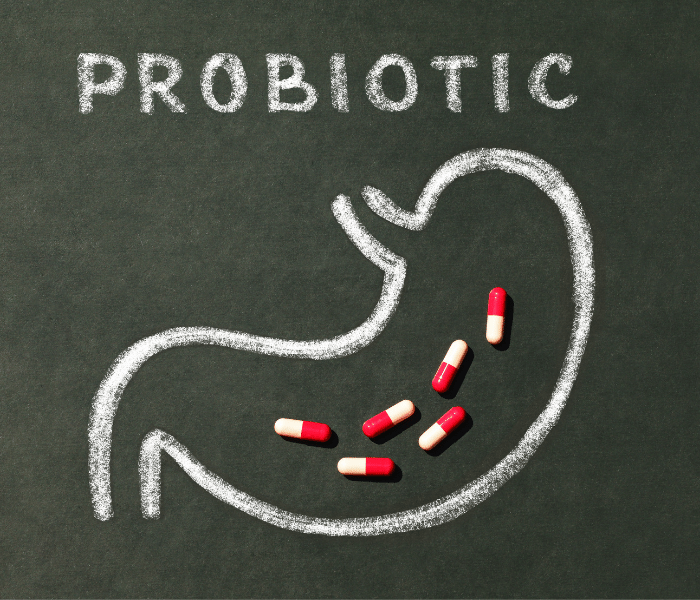
Probiotics provide energy to one’s body, and it helps in keeping ones physical, mental, and emotional health fit. It depends on one’s body type and situation whether to take probiotics every day or not.
Let us look at what probiotics mean.
Probiotics are live bacteria supplemented with microorganisms already present in the human body. The “good” or “beneficial” bacteria support the growth of good bacteria and aid in appropriate intestinal function. From the moment of birth, people are initially exposed to healthy microorganisms. All mammalian infants are given probiotics as they go through their mother’s birth canal. Then, a chain of events in the infant’s GI tract gets started, resulting in the colonization or proliferation of beneficial bacteria. There is a healthy mix of beneficial and harmful bacteria in the body. An individual’s gut health deteriorates if this equilibrium is upset and shifts in favor of a greater proportion of harmful bacteria.
It becomes very important to know when to take probiotics. Some data may be utilized in conjunction with your own experience to guide your decision, even if there is not much study that can explain what occurs when you stop taking probiotics.
People have consumed probiotic foods, including sauerkraut, kimchi, kefir, and kombucha, for over a century without causing any problems. Despite the overwhelming weight of the evidence, some hypothetical dangers are associated with probiotic use, including usage history and data from clinical trials.
These include the risk of infections, excessive immunological activation in vulnerable individuals, the potential to interfere with metabolic processes, and the risk of spreading antibiotic resistance. However, side effects are not a problem for most people, especially those who have been effectively utilizing probiotics for some time.
Probiotics are the talk of the town. They line the aisles of supermarkets and have celebrity endorsements. Probiotics are good microorganisms that help maintain a healthy stomach. A better knowledge of human health may be unlocked, according to scientists. Some foods and beverages contain probiotics, such as dairy or fermented tea. Probiotics are supplements, much like vitamins are. Regarding their advantages, manufacturers make bold claims. They consist of improved immunological function, improved digestion, decreased risk of cancer, and weight loss. But is it truly what a supplement is capable of doing?
Is It Necessary To Use Probiotic Supplements?
Bowel or digestive problems might result from a deficiency of beneficial gut flora. Some people choose to include probiotic-rich foods or probiotic supplements in their diets when these health concerns become serious.
Taking probiotic supplements has several advantages, some of which are as follows:
- Enhanced protection against conceivable food-borne infections
- An increase in vitamin B12 synthesis for more energy
- Sound bowel motions
- Enhancing immune system health
In addition to internal toxins that are the normal results of cellular activity and digestion, people are regularly exposed to environmental toxins such as herbicides, pesticides, and chemical solvents. These poisons can make the digestion process difficult and harmful.
It Is Safe To Take Probiotics
Those who utilize supplements long-term might be concerned about potential safety issues. The good news is that probiotics are unlikely to damage you in the long run. Probiotics seem to be safe even for immunocompromised people. Additionally, probiotics have been shown in a systematic study to be safe for healthy newborns. Six different probiotics were used in several experiments; none caused any negative effects or raised any safety issues.
Keeping In Mind The Benefits Of Probiotics
Though they often have a negative reputation and are associated with sickness, not all bacteria are harmful. In our intestines, which are generally referred to as the gut microbiome, we all have a diversity of living bacteria. However, the gut microbiota may occasionally get out of equilibrium. Probiotics are healthy bacterial strains that might be useful to your body. Probiotics can help us in many ways by growing good bacteria in our bodies. Among the potential advantages for health issues are:
- Boosting intestinal flora to benefit digestive health
- Improving bowel motions and alleviating constipation
- Strengthening the immune system
- Cholesterol reduction
- Limiting intestinal disorders
- Enhancing skin health
Risks Associated With Probiotics
Probiotics come in a variety of forms. Some have undergone thorough research, while others have not. Probiotics can potentially make someone sick if their immune system has been compromised by disease or drugs, according to one possible danger. Probiotics are regarded as nutritional supplements, not medications, which is another cause for worry. The FDA does not keep an eye on how probiotics are made.
It is unclear whether probiotics sold in pharmacies and health food stores are high-quality goods. It is conceivable that some inferior products do not even contain the probiotic microorganisms that are claimed to be in them.
Advantages Of Probiotics
The lower intestine tract is home to various microbes that aid digestion, bacterial defense, and immune system control. However, a microbiota imbalance can occasionally cause diarrhea and other health issues. Probiotics can assist in re-establishing equilibrium when the stomach falls out of whack due to harmful concentrations of certain microorganisms.
It has been demonstrated that they release anti-inflammatory compounds that may activate the immune system and stop infections from colonizing the body and causing debilitating illnesses. However, we are just beginning to comprehend how probiotics could improve health. Defend yourself against the harm caused by persistent inflammation. Science has established that persistent, low-grade inflammation has the potential to develop into a silent killer that fuels cancer and cardiovascular disease.
Hence, it depends on the body type, structure, and how the body takes the probiotics inside. Keeping all the positives and negatives in mind, you can take the decision now.

Lifebing is driven by an unrelenting passion for promoting health and well-being, our team is wholly committed to curating exceptional content and immersive experiences.
